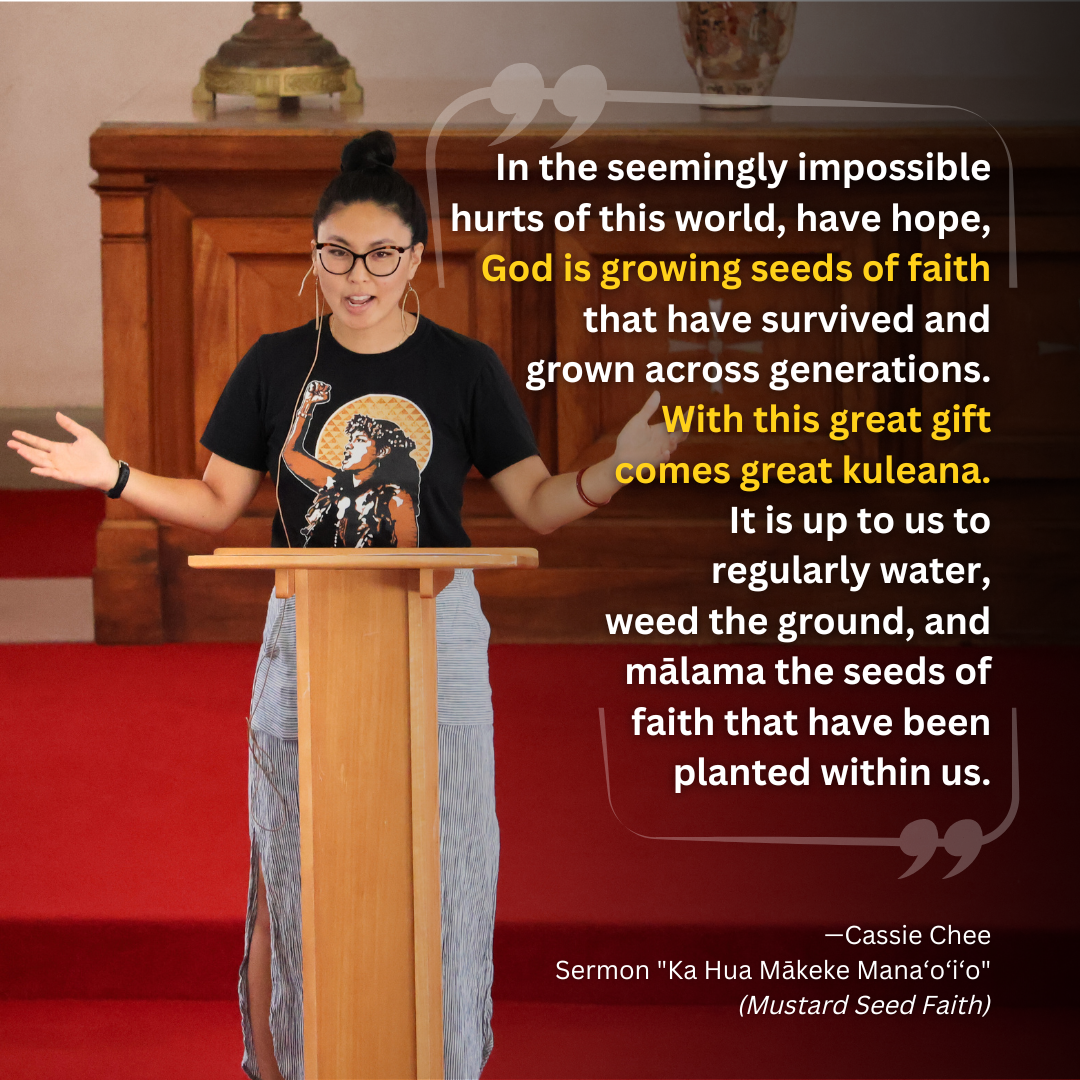“Haʻi akula ʻo ia iā lākou i kekahi ʻōlelo nane hou, ʻī akula, Ua like ke aupuni o ka lani me kekahi hua mākeke a ke kanaka i lawe a kanu iho i kāna mahina ʻai. He makaliʻi kēia hua i nā hua a pau, a kupu aʻe ia, ua ʻoi kona kino i nā laʻalāʻau a pau, a lilo aʻela ia i lāʻau, a lele mai nā manu o ka lewa, a kau iho i luna o kona mau lālā.” —Mokuna 13:31-32
“[Jesus] put before them another parable: “The kingdom of heaven is like a mustard seed that someone took and sowed in his field; it is the smallest of all the seeds, but when it has grown it is the greatest of shrubs and becomes a tree, so that the birds of the air come and make nests in its branches.” —Matthew 13:31-32
This past Monday, July 31, was Lā Ho‘iho‘i Ea, a Hawaiian Kingdom holiday celebrating the restoration of sovereign government to Hawai‘i by the United Kingdom in 1843.
Today we reflect on the Kingdom of Heaven that Jesus talks about—and that Cassie Chee, our temporary Director of Faith Formation, preached about this past Sunday. Cassie reminds us that our connection to the ‘āina and Kingdom where we worship is vital to our cultivation of hua mākeke mana‘o‘i‘o, mustard seeds of faith.
Cassie shares:
For us to understand Jesusʻ parable, letʻs talk a little bit about hua mākeke. Hua mākeke is a mustard seed, and for those of you who have never seen a mustard seed, it is as small as a grain of sand. It is a seed that grows into a large plant and from it comes many seeds. When Jesus was comparing the Kingdom of Heaven to a hua mākeke, he was saying that the Kingdom is living and growing with creation.
For a hua mākeke to grow, there is a lot of collaboration among creation that needs to happen. The mahi‘ai, farmer, needs to understand the time to plant, the conditions of the soil, where that hua, seed, came from, and what conditions make it thrive and grow. There is also a surrender to the mysterious power of the seed, sun, wai, and ‘āina itself. A doing all that can be done in collaboration with creation. When Jesus was comparing the Kingdom of Heaven to a hua mākeke, he was telling them that the Kingdom of Heaven is cultivated from the place that they live.
For people in impossible situations, Jesus was teaching of a kingdom coming that begins growing in the now. Jesus was watering whatever small seeds of hope had caused crowds of people to go and find him. Just as a seed is created from generations upon generations of plants, the Kingdom of Heaven that Jesus preached about was growing anew, yet a seed connected to the beginning of Godʻs creation.
In the beginning we know God created the earth, all the life in it, and called it good. This is the Kingdom blueprint as God designed it—all living creatures, plants, and elements breathing together in harmony. In the parable the Kingdom of Heaven does not emerge out of nowhere—it has a source, it comes from a single seed.
…
For people who come this morning to hear Godʻs teaching,
For people who come this morning burnt out and tired,
For people who come this morning with worries you canʻt get out of your mind,
Will you trust that the Kingdom of Heaven can grow from a single seed?
So in the midst of a multitude of impossible issues: personal, local, and global my questions for you saints this morning are: who planted the seed of faith within you? Who are your spiritual ancestors? What is growing within and around you? How is God calling you to cultivate the hua mana‘o‘i‘o, seed of faith, that has been given to you to steward?
In the seemingly impossible hurts of this world, have hope, God is growing seeds of faith that have survived and grown across generations. With this great gift comes great kuleana. It is up to us to regularly water, weed the ground, and mālama the seeds of faith that have been planted within us.
May we give thanks for the ancestors of our faith. May we go with curiosity for what God is growing within and around us. May we go in faith trusting that Godʻs Kingdom is here and is coming.






